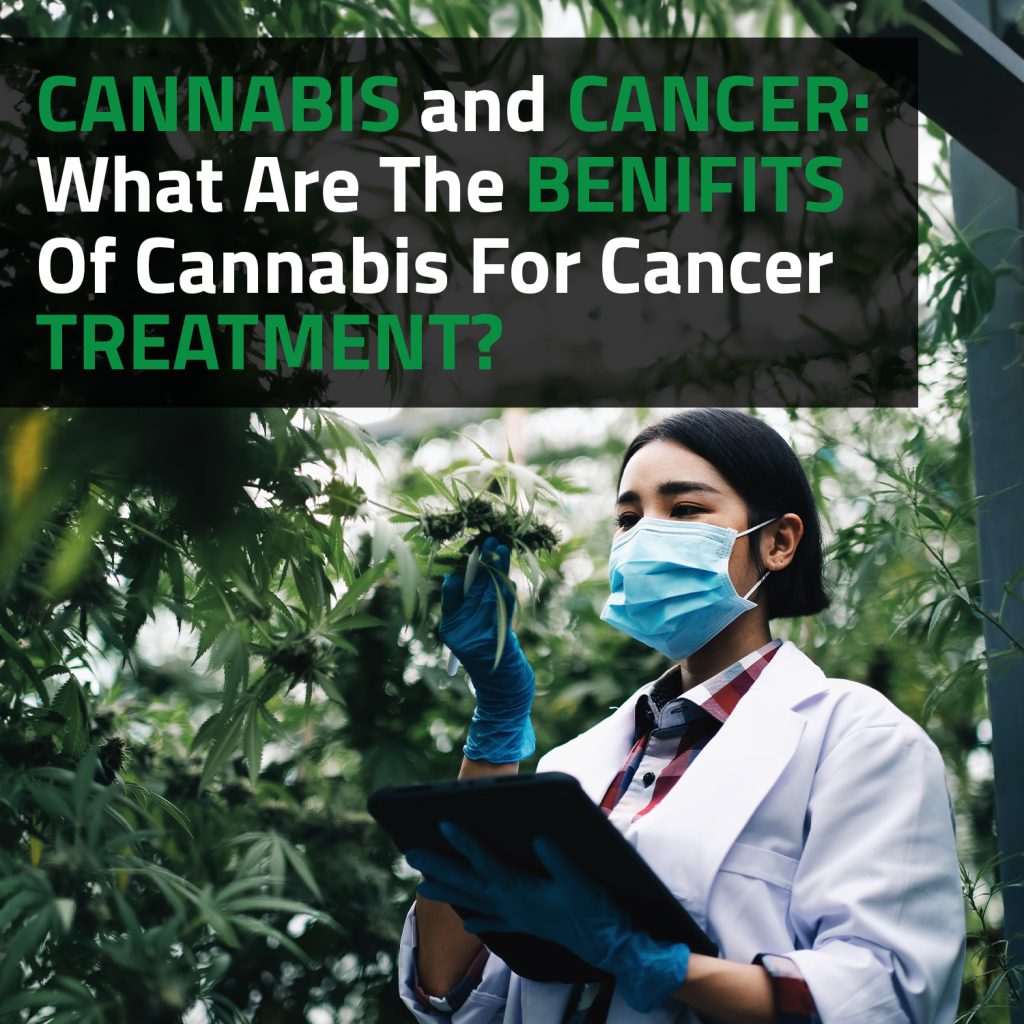In the realm of medical advancements, the potential of cannabis in cancer treatment has emerged as a subject of immense interest and exploration. As the medical landscape evolves, so does our understanding of the intricate relationship between cannabis compounds and the complex challenges posed by cancer. This article delves into the multifaceted world of cannabis as a complementary approach to cancer treatment, shedding light on its potential benefits, scientific insights, and real-life impact on patients.
Understanding The Intersection Of Cannabis And Cancer
The intersection of cannabis and cancer has captivated the attention of researchers, healthcare professionals, and patients alike. This complex relationship revolves around the potential of cannabis compounds, such as THC (tetrahydrocannabinol) and CBD (cannabidiol), to interact with the body’s endocannabinoid system.
The endocannabinoid system, a network of receptors and compounds present throughout the body, is responsible for maintaining balance and homeostasis. Researchers have discovered that the ECS is involved in various processes relevant to cancer, including cell growth, inflammation, and immune response. This connection has sparked interest in exploring how cannabis compounds can influence these processes and potentially impact cancer progression.
Cannabis has proven to be effective in:
- Managing chemotherapy side effects
- Providing pain relief
- Potentially stunting tumour growth
Managing Chemotherapy Side Effects With Cannabis
Chemotherapy, while a powerful tool in the fight against cancer, often comes with a range of distressing side effects that can significantly impact a patient’s quality of life. In recent years, cannabis has emerged as a potential ally in managing these side effects, offering relief from symptoms that can make the treatment journey even more challenging.
Nausea And Vomiting Relief
One of the most well-known benefits of cannabis, particularly THC, is its ability to alleviate nausea and vomiting. Chemotherapy-induced nausea and vomiting (CINV) can be debilitating, leading to poor appetite, dehydration, and overall discomfort. Cannabis, through its interaction with the endocannabinoid system, can help regulate the nausea centre in the brain, offering patients a natural option to manage these distressing symptoms.
Boosting Appetite
Cancer treatment often leads to a loss of appetite, which can result in malnutrition and reduced strength. The infamous “munchies” associated with cannabis use are not just a stereotype – they can be beneficial for patients undergoing chemotherapy. THC’s influence on appetite-stimulating pathways can help patients regain their appetite, leading to improved nutritional intake and a better response to treatment.
Pain Management
Chemotherapy-induced pain can stem from various sources, including nerve damage, inflammation, and the direct effects of the treatment. Cannabis’s analgesic properties, particularly those of THC and CBD, can provide relief from these types of pain. By interacting with pain receptors in the nervous system, cannabis can offer patients a natural alternative to traditional pain medications.
Anxiety And Psychological Distress
The psychological toll of chemotherapy is not to be underestimated. Anxiety, depression, and overall psychological distress are common among cancer patients. CBD, a non-psychoactive compound in cannabis, has shown potential in reducing anxiety and promoting a sense of calm. By modulating serotonin receptors in the brain, CBD can help patients navigate the emotional challenges of cancer treatment.
Restoring Sleep
Sleep disturbances often accompany chemotherapy, leading to fatigue and further compromising the body’s ability to heal. Cannabis strains high in CBD and certain terpenes can promote relaxation and support restful sleep. However, finding the right balance is crucial, as higher doses of THC can sometimes interfere with sleep patterns.
Pain Relief And Cannabis: Easing Discomfort In Cancer Patients
Pain is a pervasive and often distressing symptom for cancer patients. The physical toll of the disease, as well as the side effects of treatments like chemotherapy and radiation, can lead to varying degrees of pain that significantly impact a patient’s quality of life.
The Mechanism Of Pain Relief
Cannabis’s pain-relieving properties are primarily attributed to its interaction with the endocannabinoid system (ECS). The ECS plays a crucial role in pain modulation, and its receptors are found throughout the nervous system. When cannabinoids like THC and CBD bind to these receptors, they can influence the perception of pain and the body’s response to it.
Neuropathic Pain And Inflammation
Cancer-related pain often falls into the category of neuropathic pain, which stems from nerve damage caused by the disease or its treatments. Cannabis, particularly strains with a balanced ratio of THC and CBD, has shown promise in addressing neuropathic pain by reducing inflammation and modulating the pain pathways in the nervous system.
Finding The Right Strain
When using cannabis for pain relief, strain selection is crucial. Indica-dominant strains, known for their relaxing and sedative effects, are often preferred for managing pain. These strains can provide physical comfort and promote relaxation, making them conducive to rest and recovery. However, the choice between indica, sativa, or hybrid strains ultimately depends on the patient’s preferences and the nature of their pain.
Promising Research: Cannabis And Tumour Growth Inhibition
The potential to inhibit tumour growth using cannabis has sparked considerable interest and ignited a wave of research aimed at uncovering its intricate mechanisms and implications for cancer treatment. While the field is still in its early stages, several studies have illuminated promising avenues that suggest certain cannabis compounds may play a role in curbing the proliferation of cancer cells.
The Role Of Cannabinoids
Cannabinoids have been the focal point of investigations into their effects on tumour growth. Cannabidiol (CBD) and tetrahydrocannabinol (THC) are two prominent cannabinoids with distinct properties. CBD, a non-psychoactive compound, has garnered attention for its potential anti-inflammatory and anti-proliferative effects. THC, known for its psychoactive properties, has also exhibited anti-tumor properties in preclinical studies.
Interactions With Cannabinoid Receptors
One of the foundations of cannabis’s potential anti-tumor effects lies in its interactions with cannabinoid receptors found on the surface of cancer cells. THC’s binding to cannabinoid receptors can trigger a cascade of events that inhibit cell growth and induce apoptosis, a form of programmed cell death. CBD’s interaction with different receptors, such as those associated with inflammation and oxidative stress, contributes to its anti-tumor potential.
Different Types Of Cancer
Research has explored the effects of cannabis on various types of cancer, including breast, lung, brain, and pancreatic cancers. While results have shown promise in inhibiting tumour growth and metastasis, it’s important to note that the effects can vary depending on the specific cancer type and the interactions between cannabinoids and the tumour’s unique molecular profile.
Combining Cannabis With Conventional Treatments
Studies have also investigated the potential synergy between cannabis and conventional cancer treatments like chemotherapy and radiation. Some research suggests that cannabinoids might enhance the efficacy of these treatments while reducing their side effects. However, it’s crucial to approach combination therapies with caution and under the guidance of healthcare professionals.
Preclinical And Clinical Studies
The majority of research on cannabis’s effects on tumour growth is still in preclinical stages, meaning it has been conducted in laboratory settings or animal models. While these findings offer valuable insights, they do not necessarily translate directly to human patients. Clinical studies involving human participants are needed to validate the preclinical results and provide a clearer understanding of the potential therapeutic benefits.
In essence, the journey of cannabis and cancer is a testament to the evolving landscape of medical discovery. It underscores the importance of embracing both the potential and the complexities that this alliance presents. By arming ourselves with knowledge, empathy, and a commitment to the well-being of those facing cancer, we embark on a path fueled by the determination to uncover innovative avenues in the pursuit of health and healing.










